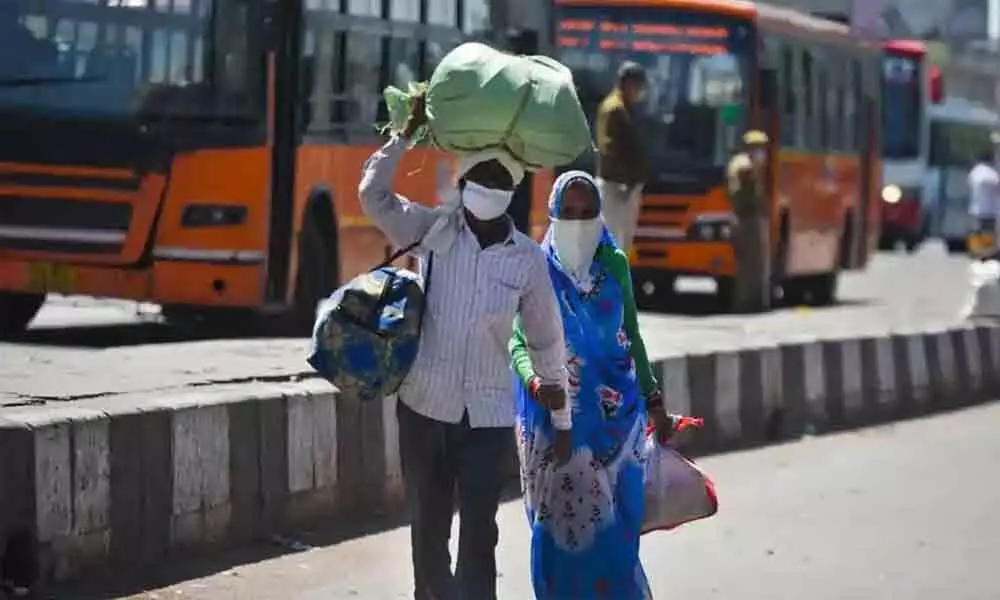Caught in worries of today, corona and health distant thoughts for pregnant daily-wagers

Pregnant labourer women walking on road amid COVID-19
Uncertainty has always been a subtext of their lives and the pandemic has only sharpened it.
NEW DELHI: Carrying bricks and cement by day and jerry cans of water when their shifts get over, the workday continues without end for thousands of pregnant labourers forced to live life on the precipice with little time to spare on thoughts of what the future holds for themselves or their unborn child.
Uncertainty has always been a subtext of their lives and the pandemic has only sharpened it.
But thoughts of COVID-19 and the risks of stepping out to work as the disease rages are a luxury for these women, many of them migrants eking out a precarious existence as construction workers hundreds of miles from home.
Some like Marjina, who is seven months pregnant, have taken a loan to tide over the difficult times when jobs and money are both scarce, others like Lalitha, approaching full-term pregnancy, continue to work with truncated wages because they have no other choice.
Living in slums that have come up in the shadows of the high-rise buildings they are helping construct in Raj Nagar Extension in Delhi's satellite town of Ghaziabad, the women know that regular doctor visits and medical checkups are not on the anvil at a time when even two square meals are difficult.
They are lucky to just find work when they can, say the women, most in their 20s or even younger and in frail health after multiple pregnancies at a young age.
Recounting her day, 27-year-old Marjina said she gets up earlier in the morning, cooks, finishes the household work and heads to the construction site with her eight-year-old daughter Marish and husband Mazru.
The family eats just once a day.
She gets tired but there is no option.
"I have been working with my husband for six years. We always had two meals a day but can't afford it any more," Marjina told PTI.
While Marjina makes Rs 250 a day, her husband gets Rs 300.
"We have cut down our meals to one a day because we have taken a loan from a relative and need to repay it," she said.
Living one day at a time as jobs dwindle, the women are forced to step up to help their husbands bring in money and there is little thought for what will happen tomorrow.
Not far away from Marjina's tenement is Lalitha's home.
Emblematic of the still widespread practice of girls being married when barely in their teens, Lalitha, just 18 years old, is nine months pregnant and already has two children.
She would earn Rs 300 a day and her husband Sanjay Rs 450 before the pandemic struck.
The money was sufficient to feed their family of four.
Now a third child is on its way and the couple is frantic about how they will manage.
Lalitha got an ultrasound done in the early days of the lockdown but the savings have dwindled as have the daily wages and the work.
She goes to the construction site but sometimes there is no work.
"I have not been going to work for the past several days. Lalitha may have to be taken to the hospital anytime. These days are so difficult for everyone so we can't even borrow from anyone and the contractor refuses to advance us any," said Sanjay helplessly.
Life was anyway a struggle and the last few months have just made things so much worse, added Saroj who also lives close by.
She is 25 and is expecting her fifth child.
Malnourished and weak, Saroj, who is five months pregnant.
said she and her husband Pappu together made almost Rs 25,000 a month as daily wage masons.
After the lockdown in March, the money has been cut by almost 60 per cent and now there isn't enough to eat.
But Saroj goes to work gamely in the hope that a day's work will get some money in.
The last few months have extracted a terrible toll on the families of the labourers.
Gudiya, 19, is six months pregnant and exhausted.
Soon after the lockdown, she went to her village in Aligarh but there was no work so she returned to Ghaziabad.
Her husband Ravi and she manage to work for about four days a week as construction labourers, earning about Rs 400 a day.
"But there is no money for medicines and there are days we go to sleep hungry," she said.
The couple has one child.
Their stories find echo several kilometres away in the Red Fort area in Old Delhi, not new and upcoming like Raj Nagar Extension but old and historic where generations have lived.
Sukhwati, who will be expecting a baby in three months, works at a construction site in the area.
While she earns Rs 300 a day, her husband Kashiram gets Rs 400.
"It is getting difficult to survive. The contractor doesn't give us enough work," the 21-year-old from Bihar who is expecting her fourth child said.
How will these young women, battling ill-health and already burdened with debt and worries about feeding their children cope when another baby comes along? Caught in the stresses of today, there is little time to think of tomorrow or of the child born in a time of spiralling uncertainty.
















